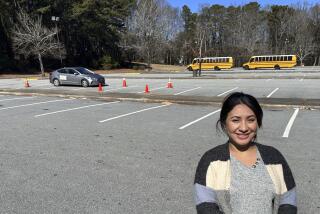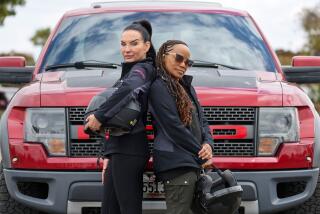Ex-Secretary Unlocked Secrets Under the Hood and Never Looked Back
Like many women of her generation, Susan Nestor, 37, showed no particular signs of mechanical ability as a girl. In fact, the aptitude tests she took in high school led counselors to discourage her from trying anything technical.
However, after a less-than-fulfilling stint as a secretary, Nestor found the work she loves. For the past 7 1/2 years, the curly-haired woman in a blue jump suit has owned and operated the Women’s Garage in Canoga Park. And, although the auto-repair shop has been economically successful and emotionally satisfying for Nestor, it has spawned no imitators. Except for one in San Francisco, Nestor knows of no other full-service garage owned and operated by women.
Some time before she and then-partner Toni Gallucci opened the shop in May, 1978, Nestor was introduced to auto repair when a friend showed her how to replace a fuel pump on her car.
“Not only did my car run but it ran better,” Nestor said. “I was thrilled by the positive feedback, which I didn’t get from anything else. It was instant, it was gratifying, and I saved a lot of money.”
Next, Nestor took a class in rebuilding motorcycle engines. “I felt comfortable because the engine I worked on was small,” she explained.
Turning Point
This was a turning point for Nestor. “When I took the class, not only was I mesmerized, I was shocked that it appeared to be so simple,” she said. “All of these mechanical things are so cloaked in mystery that I thought I would never be able to understand any of it and, instead, I found it simple.”
Nestor enrolled at West Valley Occupational Center, a trade school in Woodland Hills, and eventually became a full-time student. She then worked on rebuilding engines at General Motors, Chrysler and Ford training schools.
Finally, she and Gallucci, who had undergone an similar transformation, borrowed $5,000 and opened The Women’s Garage in a cinder block building on a side street crammed with body shops and towing services off Sherman Way. From the beginning, the only feminine touch has been a row of plants, mostly of easy-to-care-for pothos, balanced on the ledge separating the “office” from the main floor of the four-car garage.
The shop received a lot of media attention. “Six or seven years ago it was the height of feminism--it was like all eyes were upon us,” Nestor said. Still, word of mouth accounts for most customers. Half of the garage’s customers are women, though for the first two years most were female. (Owners of several other repair shops say a clientele of half men and half women is typical.)
Early plans to open other shops and perhaps franchises have since faded. Nestor and Gallucci drifted apart, and Nestor bought out her partner’s interest. “As time went on, I realized that one shop is a lot of work and requires a lot of attention,” Nestor said. “There are just too many variables.”
Along with Nestor, two other full-time women mechanics now work at the garage, one of them manager Diana Gamboa. Through the years, two male mechanics have worked at the garage, one of them an automotive-shop instructor who has returned every summer for six years. Nestor has trained two or three women.
“The women I’ve trained have had very little background,” she said. “It’s almost impossible to find a skilled woman mechanic. I look for personal characteristics, like the ability to go wrong and to get back into the problem and solve it, and patience. And a certain mental willingness.”
Becoming a skilled mechanic involves more than gaining basic skills, Nestor said. “There’s a whole other thing that goes on, especially for a woman in any kind of technical trade, and that is that, if you’re a novice and you don’t have a mentor to go to, there are so many tricks of the trade. Your daily survival in terms of being able to do your work requires this kind of information for the first two years at least.
‘Pounding Her Head’
“A woman can be standing there, she may have been taught how to do a brake job and she’s done many in her vocational school. And here she is working on a Fiat brake system and she can’t get the brake drum off. She’s pounding her head against the wall until someone comes along and says on that particular model there’s a clip back here. . . . It’s like any other profession. Are they all rushing out of their old-boys’ networks to welcome you in and show you the trade? I don’t think that happens.”
For whatever the reasons, few women are entering the field. “In the seven or eight years I’ve been here, I haven’t seen an increase,” said Hilde White, a placement representative from the state Employment Development Department office at the occupational center. “There are a few each year, and the ones I do place are very good and they get placed in excellent jobs at garages.
“They have reported back to me that they do have a little bit of a problem working in a garage where there are lots of men, that they’re teased and so forth.”
Other schools surveyed also reported minimal numbers of women training to be auto mechanics. The school director of the Van Nuys campus of Pacific Coast Technical Institute, for example, reported that no women had gone into their auto mechanics courses, though one or two had taken an auto paint and body course and that one completed training as a machinist.
‘Do It On Their Own’
Lyle Stevenson, head of the technology department at Santa Monica City College, said there are now three women among 350 students in the auto program. “We have a lot who start out in our fundamentals program, lower-level courses, but very few who go beyond that. I think they’re basically not interested in a career, but to do it on their own.”
Of 747 students enrolled in auto tuneup classes last year at North Valley Occupational Center in Mission Hills, only 18 were women. Of those, two are now mechanics (12 are still in school). Similar statistics were reported for other auto-related courses at the center.
A job placement analyst with the Los Angeles Unified School District’s Regional Occupational Programs, Bob Ronan, agrees with Stevenson’s theory that a number of women are taking these auto mechanics courses for their personal knowledge. Ronan’s job-market surveys have shown that the mechanic jobs are available, and “there’s always a need for good mechanics and I have found that a garage or repair shop for an automobile agency will hire anyone as long as that person comes equipped.”
What it means to “come equipped” has changed dramatically in the last few years, however. No longer is it enough to know how to change a fan belt and do a tuneup, according to Nestor.
‘Field is Changing’
“The field is changing very rapidly,” she said. “I think the day of the mechanic who didn’t have a lot of expertise or a lot of theoretical understanding or who isn’t up to date is quickly disappearing. The ones surviving and doing well are those who are sensitive to the fact that auto repair is the foremost consumer complaint.”
A mechanic’s theoretical knowledge and ability to diagnose is what costs customers at today’s garages, according to Nestor. “It used to be that finding out what was wrong was a freebie,” she said. “Now the diagnosis is becoming ultra-sophisticated. It takes standing over somebody’s shoulder for a couple of years to train them, or having them stand over your shoulder for a couple of years.”
Nestor has been training Kim Williams at The Women’s Garage for six months. During her one semester and a summer session at West Valley Occupational Center, Williams, 43, was the only female in her class. She said the men tended to cater to her. “They did and I watched.”
Formerly an office worker and an electronics assembler, Williams much prefers auto repair. “I love to work on cars,” she said. “Sometimes it’s really a challenge. Office work is boring and the pay is lousy.”
Attended Pierce
Nestor, who lives in Venice, likes a challenge, too. For the past several years she has been attending Pierce College and now California State University, Northridge, in the evenings. She plans to receive her bachelor’s degree in business administration sometime next year. She is planning to study for a master’s degree after that. Although she still gets under cars regularly, she says, “The actual repair work can get boring after you’ve repaired a particular thing a number of times. The diagnosis of cars is still extremely interesting, and every year there are 20 new models to work on. My interest is equally divided between diagnosing and the business end.”
Business may be Nestor’s ultimate direction. She has become very interested in finance and has recently helped found an investment club.
Lenore Rosenberg of Canoga Park, a longtime customer, said she hopes Nestor keeps on doing exactly what she’s been doing. Said Rosenberg, “I get a nice feeling at the Women’s Garage.”






